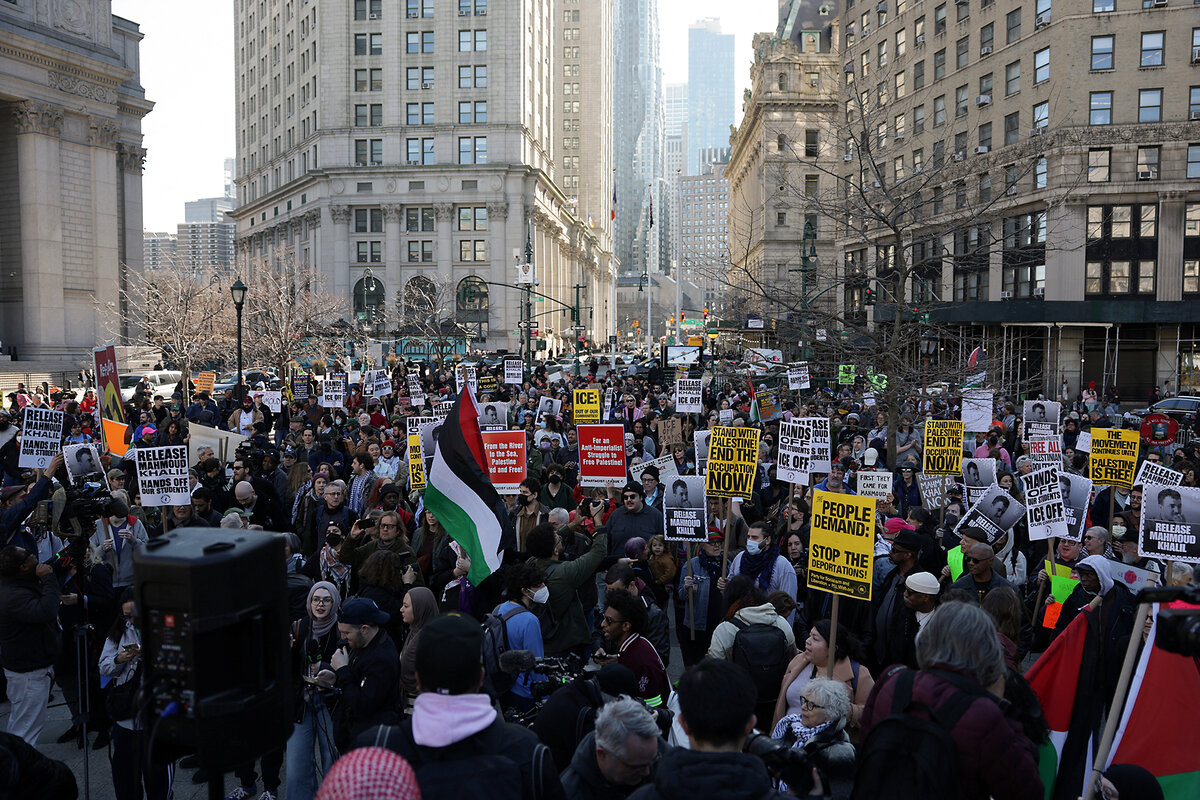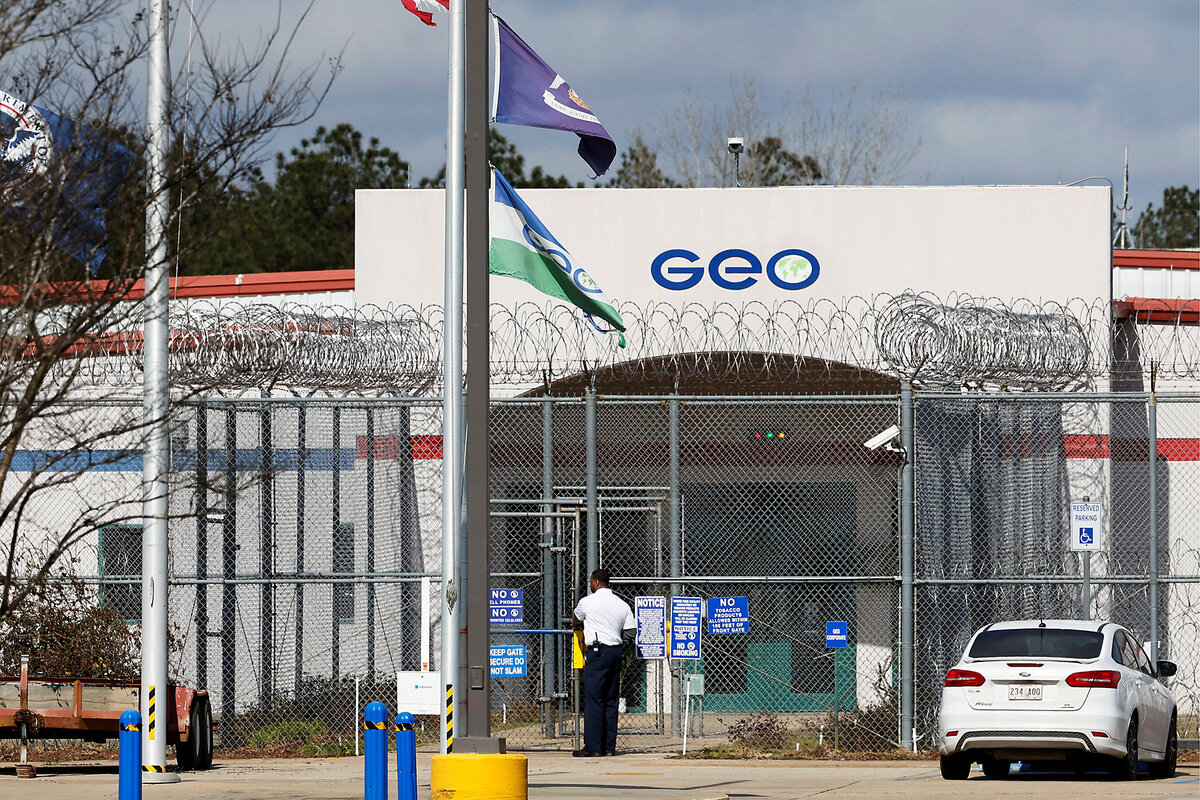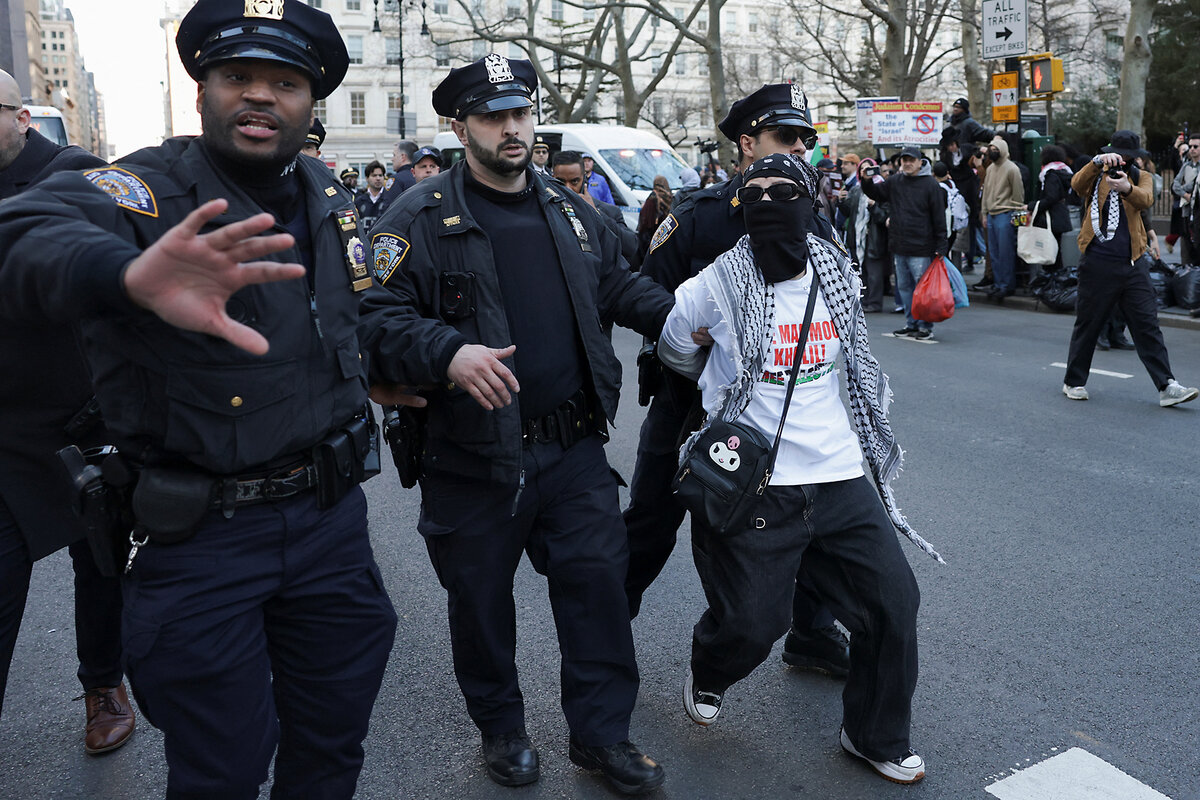Columbia protester arrest ignites free speech tug-of-war
Loading...
The college campus tumult over Israel’s war in Gaza has collided with the United States’ immigration debate.
The Trump administration’s framing of its detention of a Palestinian student activist as a defense against rising antisemitism is a move that launches, in effect, a new round of free speech tug-of-war.
Nearly a week after immigration officials arrested Mahmoud Khalil, a green-card holder living in New York, there are still no formal charges against him outside of immigration court. President Donald Trump has the Palestinian activist a “Radical Foreign Pro-Hamas Student” and “the first arrest of many to come.”
Why We Wrote This
The Trump administration appears to be in uncharted legal waters as it seeks to define – and deport – people it sees as threats. Some view Mahmoud Khalil’s case as part of a crackdown on dissent.
Immigrant advocates and many legal experts have decried Mr. Khalil’s detention as a possibly unconstitutional violation of free speech. They also warn of the tactic’s potential chilling effect on other immigrants and Americans alike.
Beyond the issue of civil liberties is the seemingly ascendant role of the secretary of state. A provision of immigration law affords the office a specific deportation power, which the Trump administration is invoking now, according to an immigration court document by The Washington Post.
Immigration experts say the country may be entering uncharted legal waters as the government seeks new ways to identify and deport people it considers threats to American foreign policy.
“Like a lot of things that this administration is doing, it’s pushing the law to the limit,” says Gabriel Chin, an immigration law scholar at the University of California, Davis School of Law. “It’s unusual, at least since the McCarthy era,” he adds, to attempt to deport immigrants for “controversial political activity.”
Where and when the latest tensions began
On Oct. 7, 2023, a Hamas-led attack killed around 1,200 people in Israel and took 251 hostages. Israel retaliated with an air and ground campaign that has killed at least 48,500 people, according to the local health authority. Protests over the war have roiled colleges across the U.S., including Columbia University in New York. Masked demonstrators occupied parts of campus and disrupted classes.
In the following months, Mr. Trump began discussing student visa revocations on the campaign trail and then set the stage on Day 1 of his new administration, Jan. 20, 2025. That day, he signed an vowing protection of U.S. citizens from immigrants who “intend to commit terrorist attacks, threaten our national security, espouse hateful ideology.” Also in January, he , introduced in his first term, to “combat anti-Semitism vigorously” – including through prosecution and deportation.
A Palestinian from Syria, Mr. Khalil is a recent Columbia graduate student who has had a green card, also known as a permanent resident card. That means he has been authorized to live and work in the U.S. with a path to citizenship. Unlike migrants seeking to enter the U.S., immigrants who are in the country are entitled to due process in removal proceedings. Last year, he became a public face of student-led protests against Israel’s war in Gaza.
“It’s time for us to show that yes, we want to be visible,” he in April, standing before a tent encampment. “The university should do something about what we’re asking. ... They should stop investing in this genocide.”
The New York Times that Mr. Khalil described his role as a negotiator and spokesperson for a pro-Palestinian group called .
The group drew scrutiny this past summer for what appears to be a now-deleted Instagram post in support of Bengali protesters. Local news the post as saying, “We are Westerners fighting for the total eradication of Western civilization.”
Whether Mr. Khalil was involved in the post is unknown. A law firm representing him did not respond to a request for clarification.
Federal immigration officials arrested Mr. Khalil at his university housing Saturday, according to a court document. They first told him his detention was due to his student visa having been revoked by the State Department, according to the filing. But after they were shown documentation that he was a lawful permanent resident, the agents arrested him anyway, saying that his green card had also been revoked, the document said.
Mr. Khahil was transferred from New York to Immigration and Customs Enforcement (ICE) custody in Louisiana. In a through a lawyer, the activist’s pregnant wife, a U.S. citizen, asked the public for support: “I need your help to bring Mahmoud home,” she said.
On Sunday, Mr. Khalil’s counsel filed a – claiming his detention is unlawful – in federal court. Judge Jesse Furman temporarily barred the government from deporting Mr. Khalil pending further proceedings in the Southern District of New York. In court Wednesday, counsel for the government said it wanted to move the case out of New York. Mr. Khalil’s legal team said it hasn’t been able to reach its client since his transfer to Louisiana over the weekend.
Immigrants, including green-card holders, for a variety of reasons. It does not appear that the government has filed any criminal charges against Mr. Khalil. He has not been accused of contacting Hamas.
However, the government appears to be relying on a part of immigration law that permits certain input from the secretary of state. An immigrant can be deported if the secretary determines that they “would have potentially serious adverse foreign policy consequences” for the country. (The secretary of state then notifies the Department of Homeland Security, which can initiate deportation charges.)
A spokesperson for the State Department referred to that part of immigration law, without elaboration, in response to questions from the Monitor about Mr. Khalil’s case and visa revocation plans. The day after the arrest, Secretary Marco Rubio , “We will be revoking the visas and/or green cards of Hamas supporters in America so they can be deported.”
White House press secretary Karoline Leavitt has accused Mr. Khalil of organizing “group protests that not only disrupted college campus classes and harassed Jewish American students [but also] made them feel unsafe on their own college campus.”
Mr. Khalil has an initial immigration court date in Louisiana on March 27, according to his notice to appear, which he refused to sign. His is now among the more than 3.7 million cases in immigration court.
A matter of dissent
The government’s arrest of Mr. Khalil has drawn praise from its MAGA base while . The Anti-Defamation League praised the administration and that any deportation or revocation of legal status must be carried out “with required due process protections.”
Anyone in the U.S. with a visa or green card is a “guest, and if they’re going to call for terroristic activity, they need to leave,” says Lora Ries, director of the Border Security and Immigration Center at The Heritage Foundation. Despite logistical limits to Mr. Trump’s promised mass deportations so far, “Inciting violence and support for terrorism is good grounds for using ICE resources,” says Ms. Ries, an immigration official during the first Trump term.
Meanwhile, solidarity protests supporting Mr. Khalil have cropped up in California, Illinois, and New York, while a demanding his release has garnered more than 2.9 million signatures. In Congress, 14 Democrats decrying the arrest as “an act of anti-Palestinian racism,” along with being a “lawless abuse of power and political repression” threatening all Americans.
At the New York Immigration Coalition, Murad Awawdeh, president and CEO, called Mr. Khalil’s targeting a “blatantly unconstitutional act.” In a statement, he also appealed to local elected officials to intervene.
The U.S. has a long history of ideological exclusion and deportation, says Julia Rose Kraut, author of “Threat of Dissent: A History of Ideological Exclusion and Deportation in the United States.”
“While the targets have changed over time, the use of ideological exclusion and deportation as tools of political repression have not,” she says.
The legal historian points to the McCarthy era of the 1950s that targeted communists, real and suspected. While 231 people were deported on ideological grounds between 1950 and 1956, she says, this strategy was less about numbers and more about fear.
It’s unclear how many foreign-born students the current administration will seek to deport on political grounds. Even if limited, says Professor Chin, the effort could still be “hugely symbolic, and possibly quite effective” at stifling dissent.
He raises the question of whether the government will have to justify its conclusion – in this case, why it sees Mr. Khalil as a potential source of “adverse foreign policy consequences.”
On foreign policy, however, the Supreme Court has said that “a very large amount of deference” should be given to the administration, says George Fishman, senior legal fellow at the Center for Immigration Studies. At the same time, determining deportability through the secretary of state – or on terrorism-engagement grounds – has been largely untested in federal courts, he says.
Others are wary of government retaliation against First Amendment-protected speech.
“Conflating ‘pro-terrorist,’ ‘anti-Semitic,’ and ‘anti-American’ activity is an incredibly dangerous step to take,” legal scholar Steve Vladeck in his newsletter. While the first may be enough to deport a green-card holder, he says, “The second and third, by themselves, shouldn’t.”
Part of a broader crackdown
As legal questions swirl, Mr. Khalil’s case emerges as part of a broader crackdown.
The secretary of state is launching an artificial intelligence-powered effort to cancel the visas of those who appear to support Hamas or other groups designated as terrorist organizations, Axios, citing unnamed senior officials. Reuters that the American-Arab Anti-Discrimination Committee is aware of “a number of Palestinian students” who’ve had visas revoked since Mr. Trump returned to office. The State Department did not directly address requests for confirmation of either report.
Beyond people, Washington is also targeting institutions. Last week, the Trump administration the cancellation of some $400 million in federal grants to Columbia University, citing inaction on harassment of Jewish students. This week, the Department of Education it sent letters to Columbia and 59 other higher education institutions warning them to protect Jewish students or face “potential enforcement actions.”
The White House has continued to foreshadow more student arrests.
“Columbia University has been given the names of other individuals who have engaged in pro-Hamas activity, and they are refusing to help [Homeland Security] identify those individuals on campus,” press secretary Ms. Leavitt on Tuesday. The university did not respond to a request for comment.
The president, she said, is “not going to tolerate that.”










